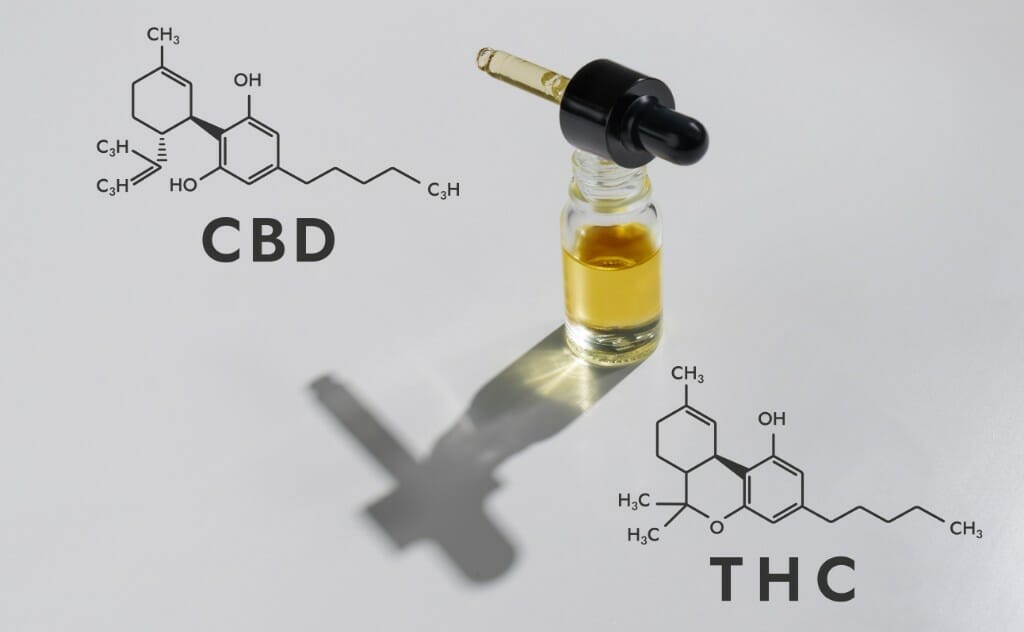Today we will discuss two substances found in the cannabis plant, two substances that are sometimes confused and around which many questions still revolve: tetrahydrocannabinol and cannabidiol.
These are two molecules that have different effects on our bodies, which are the subject of much scientific research and which continue to arouse great interest among consumers.
Tetrahydrocannabinol (THC) is mainly responsible for the psychoactive effects of cannabis. It can have beneficial effects on certain medical conditions such as chronic pain, nausea, appetite and glaucoma. However, it can also cause unwanted effects such as anxiety, paranoia, tachycardia and addiction.
Cannabidiol (CBD), in contrast, has no psychotropic effects and has been studied for its anti-inflammatory, analgesic, anxiolytic and anti-psychotic properties. It has also been proposed as an antagonist to THC. This means that it reduces or cancels its negative effects.
This is why CBD is legal while THC is controlled in many parts of the world.
Tetrahydrocannabinol and cannabidiol are two different substances, both of which have health enhancing properties but should not be confused. Cannabis contains both molecules in varying proportions depending on the variety and cultivation method. Some varieties have a high THC content and a low CBD content, and vice versa.
Together we shed light on tetrahydrocannabinol and cannabidiol to avoid false myths and approach cannabis with greater awareness.
What is cannabidiol (CBD) used for?
Cannabidiol, more commonly known as CBD, is one of the many cannabinoids found in the cannabis plant. Scientists have been studying its properties for many years. They have come to the conclusion that CBD has multiple health benefits and can be used for various therapeutic purposes.
Some studies suggest that CBD may help reduce anxiety and depression, relieve pain and inflammation, improve sleep quality, and even reduce symptoms associated with schizophrenia and convulsions.
What is the main difference between THC and CBD? As we have already mentioned, CBD has no psychotropic effects, which means that it will not make you ‘high’ or have psychoactive effects like THC.
However, it is important to note that studies on CBD are still ongoing and that there is a lot of information yet to be discovered about its therapeutic properties. For this reason, many CBD products are becoming popular, but its use for therapeutic purposes should be supervised by a doctor or an expert in the field.
What is tetrahydrocannabinol (THC)?
Tetrahydrocannabinol, more simply called THC, is the second most important cannabinoid found in the cannabis plant. In fact, to be precise, it was the first to be discovered by scientists, even before CBD.
THC is the main compound responsible for the psychotropic effects associated with marijuana use, including the feeling of euphoria, the distortion of sensory perception and the alteration of reaction time.
It produces this effect by binding to cannabinoid receptors in the brain and central nervous system, thereby altering the transmission of nerve signals and producing the effects that are too often sought by cannabis users.
Although THC has proven therapeutic properties, in high doses it is also considered a narcotic in many countries due to its psychotropic effects that lead to abuse and addiction.
Its ability to affect cognition and memory can cause short- and long-term learning problems, especially in individuals under the age of 18. It may also have other undesirable side effects such as increased heart rate, dry mouth, anxiety, paranoia and coordination difficulties.
For all these reasons, products accessible to the masses contain only a small percentage of THC, which is insufficient to provide a high. There are drugs that contain high doses, but in Italy they can only be purchased and used with a doctor’s prescription in specific situations where the therapeutic benefit outweighs the associated risks.
What does CBD do to our bodies?
Scientists wondered why CBD was able to produce so many beneficial effects. When they understood how it interacts with the body, they discovered a whole system in the human body that they did not know existed.
In particular, they found that tetrahydrocannabinol and cannabidiol interact with the endocannabinoid system (ECS).
The endocannabinoid system is a body-wide signalling system that helps maintain homeostasis, i.e. the body’s internal balance. It consists of cannabinoid receptors, enzymes and endocannabinoids, which are chemicals produced by our body that are chemically similar to the cannabinoids produced by the cannabis plant.
Among the potential beneficial effects of CBD on our bodies are:
- Reducing inflammation: helps reduce both local and diffuse inflammation, which may be associated with trauma or disease;
- Pain relief: reduces pain, both acute and chronic, by improving our nervous system’s response to the stimulus;
- Protecting bones: accelerates bone fracture recovery;
- Other benefits: CBD has positive effects on cardiac health, skin health and the immune system.
As far as the body is concerned, CBD can be taken in different ways. For instance, CBD oil can be used orally or directly on the skin. Depending on the method chosen, the effects also change.
How does CBD affect the brain?
Again through its interaction with the endocannabinoid system, tetrahydrocannabinol and cannabidiol affect brain activity. CBD regulates various functions such as mood, memory, pain and inflammation.
Some of the effects of CBD on the brain already observed in studies are:
- Improving fronto-striatal connectivity at rest, involved in cognition and motivation;
- Modulating brain activity during cognitive tasks such as emotional processing, verbal memory, response inhibition and auditory/visual processing;
- Having opposite effects to those of THC, the main psychoactive component of cannabis, on certain brain areas such as the temporal and frontal;
- Showing brain activity in subjects at high clinical risk for psychosis and in patients with established psychosis;
- Modulating resting limbic activity in subjects with anxiety and metabolite levels in patients with autism spectrum disorders;
- Treating epilepsy, due to its ability to reduce the intensity and frequency of seizures;
- It affects the levels of certain neurotransmitters in the brain, such as serotonin and dopamine, which are involved in the regulation of mood and anxiety;
- Reducing the heart rate during sleep and increase the duration of slow-wave sleep.
All these effects are possible due to CBD’s anti-psychotic, anxiolytic, anti-inflammatory and neuroprotective properties.
What is the most prominent side effect of cannabidiol?
Like any active substance, CBD can have side effects. These may vary from person to person and also depend on the dosage and the quality of the product.
The most common side effect of CBD is drowsiness or tiredness, especially if a high dose is taken. Other possible side effects include:
- Changes in appetite;
- Dry mouth;
- Diarrhoea;
- Low blood pressure;
- Dizziness.
Be aware, however, that CBD is considered safe and well-tolerated by the WHO when taken in the recommended doses.
The negative effects of CBD that emerged during the studies were rare, mild and temporary. To make them disappear, simply reduce the dose or stop taking the product. In most cases they emerged as a consequence of interaction with other drugs, so it is always best to seek advice from your doctor if you want to treat a disorder with CBD.
Why should you take CBD products?
There are two main purposes for taking tetrahydrocannabinol and cannabidiol products: maintaining good health and treating specific ailments.
Maintaining good health is essential for preventing many diseases and improving one’s quality of life. Taking CBD products can help achieve this, as CBD stimulates our endocannabinoid system by regulating many bodily functions such as sleep, appetite, and mood. Taking CBD can help maintain balance in the body and mind, which always go hand in hand.
On the other hand, when health problems occur, taking CBD products can be helpful in treating symptoms and improving quality of life, without the side effects often associated with traditional drugs. CBD can be helpful in relieving pain, reducing inflammation and improving mental health, among other benefits.
Many consumers are choosing CBD products because they are a natural and safe alternative to maintain health or treat illnesses. Always with the understanding that it is important to consult your doctor before starting any kind of treatment or supplement.

What are the products with CBD?
CBD has become the basic ingredient in many skin care and wellness products, sometimes alone and sometimes combined with other active ingredients.
Some of the most common CBD-containing products include:
- CBD oils: these are extracted from cannabis plants and can be taken directly or added to other foods or beverages;
- Body creams: these products contain CBD oil and other natural ingredients that can help relieve pain and inflammation;
- Wellness products: such as capsules, herbal teas or candies, which can help relieve stress and improve sleep;
- Products for animals: such as biscuits and oils, which can help our four-legged friends feel better.
If you are interested in discovering Maria CBD Oil products, visit our online shop where you will find a wide selection of high-quality CBD products. Feel free to take a look and contact us if you have any questions or concerns!
 Contact us
Contact us 
